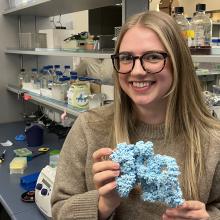Alexandria Shaw
Why did you decide to pursue a graduate degree?
During my undergraduate degree at the University of Victoria, where I completed an BSc (honours) in microbiology, I got involved in research in my fourth year during my honours project. Given that it was 2021, my project was completed entirely remotely, and while I enjoyed conducting research, I really missed the wet lab work. I then worked as a lab technician in Dr. John Burke’s lab where I got hands-on-experience in cloning, recombinant protein purification and a structural biology technique called hydrogen-deuterium exchange mass spectrometry. I was able to prepare a first author manuscript and this process made me realize that I enjoy the entire research process and that I wanted to pursue a graduate degree.
Why did you decide to study at UBC?
I really enjoyed both the research topic(s) and techniques I was researching/using in the Burke lab. Dr. Burke had recently become an adjunct professor in UBC’s Department of Biochemistry and Molecular Biology and was recruiting a joint graduate student with Dr. Calvin Yip to carry about cryo-EM structural studies at UBC. This position would allow me to carry out research in both labs at two institutions, further expanding my network.
What is it specifically, that your program offers, that attracted you?
What specifically attracted me to my program was the resources and expertise available for structural studies of proteins using electron microscopy. The Life Sciences Institute (LSI) houses the High Resolution Macromolecular Cryo-Electron Microscopy (HRMEM) facility with state-of-the-art electron microscopes and exceptional research staff that would allow me to learn how to conduct negative stain and cryo-EM experiments.
What was the best surprise about UBC or life in Vancouver?
As someone from Vancouver Island who grew up surrounded by the ocean and the mountains, I didn’t think Vancouver's landscape was that special; however, I was wrong – it truly never gets old. It’s also so much easier to go to concerts and Canucks games when you live in Vancouver!
What aspects of your life or career before now have best prepared you for your UBC graduate program?
I was fortunate to publish and present my research from my undergrad before starting my graduate program. This greatly prepared me for writing research proposals and making research presentations and posters in grad school. Additionally, my experience working in a restaurant during high school helped me develop strong multitasking skills, which have come in handy during my grad studies.
What advice do you have for new graduate students?
When looking for a research supervisor, you want to make sure they're the right fit for you! Also, talk with current lab members and make sure it’s a research environment that is suitable for you! Remember this is a huge commitment (especially if you’re doing a PhD), so don’t make this decision lightly.
Learn more about Alexandria's research
Lipids serve as essential building blocks for the biological barriers that protect cells, and they also play an essential role in coordinating biological processes like growth, differentiation and development. The production of signalling lipids is carefully regulated to ensure they are generated at the appropriate time and place. My research centers on PI4KA (Phosphatidylinositol 4-kinase alpha), an enzyme that is involved in a variety of neurodegenerative and immunological diseases. While previous studies have identified the components of the PI4KA protein complex and its cellular locations, the regulation of PI4KA’s activity remains largely unexplored. Using structural biology techniques such as cryo-EM and hydrogen-deuterium exchange mass spectrometry, my project aims to clarify how PI4KA is regulated at the molecular level to build the necessary framework for the development of therapeutic strategies.

